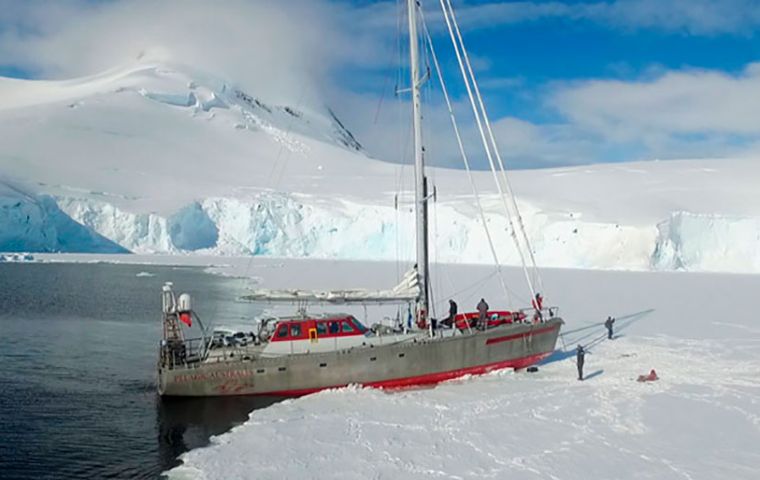MercoPress. South Atlantic News Agency
Scientific survey of penguins response to climate change in Falklands, South Georgia and Antarctica
 The team stayed on board the purpose-built Antarctic expedition yacht, Falklands' based, Vinson of Antarctica, VOA, for 30 days
The team stayed on board the purpose-built Antarctic expedition yacht, Falklands' based, Vinson of Antarctica, VOA, for 30 days An international team of scientists, including two from the University of Bath, has just arrived back from an expedition studying penguin colonies in the Falkland Islands, South Georgia, and Antarctic Peninsula, reports Phys-org.
Dr. Jane Younger, Prize Fellow and Lecturer in the Milner Centre for Evolution at the University of Bath co-led the expedition with Dr. Gemma Clucas, a seabird biologist who comes from Bath but is now based at Cornell University, (Ithaca, U.S.).
Along with Jane's Ph.D. student, Katie O'Brien, the three scientists were part of a team of nine researchers from six institutions and three countries, all studying different aspects of the penguins' response to climate change.
The team stayed on board the purpose-built Antarctic expedition yacht, Falklands' based Vinson of Antarctica, VOA, for 30 days, exploring several areas around the region including uncharted waters on the Antarctic peninsula that hadn't been surveyed in more than 30 years.
Braving freezing temperatures and carrying oars to fend off inquisitive fur seals that got too close, they did a wide range of research, which included collecting penguin poo to study their diet and the diseases that affect them, and using a drone to count the number of birds in each colony to monitor population trends.
The scientists studied several populations of seven different species of penguin: gentoos, kings, rockhoppers, macaronis, magellanic, chinstraps and Adélies.
The team will now spend the next few months genetically analyzing the samples to identify which diseases and parasites are present in the penguins, what they are eating, and how the penguins have evolved to adapt to their environments, particularly in response to climate change.
Dr. Younger said: “I've spent many years researching penguins but this is the first time I've visited the West Antarctic.
”My research looks at the diseases and parasites that affect the different penguin populations, studying how they spread between the different species of penguins and monitoring how they are changing over time.
“Using a small vessel meant we could access more areas, taking samples from regions that hadn't been surveyed for several decades, which will give us a much better picture of what's happening across the Antarctic.
”Our expedition coincided with the 100-year anniversary of Shackleton's death, so we visited his grave on South Georgia whilst we were there.
“It was fantastic to work with colleagues from a number of different institutions and we look forward to planning another similar trip in the next year or so.”
Dr. Gemma Clucas, from Cornell University, said: “I've been visiting Antarctica for the past ten years to study penguins.
”Most penguins, seals, and whales eat krill in Antarctica, but climate change and fishing pressure are reducing the amount of krill available to them.
“My research is focused on studying penguin poo to look at how the diets of the different species are changing over time. Picking up poo from around colonies is a remarkably easy and non-invasive method to do this, and so it's really opening up the amount of sites that we can monitor each year.”
“I also used a drone to count the penguins in each colony to understand how populations are changing in response to climate change.”

Top Comments
Disclaimer & comment rulesCommenting for this story is now closed.
If you have a Facebook account, become a fan and comment on our Facebook Page!